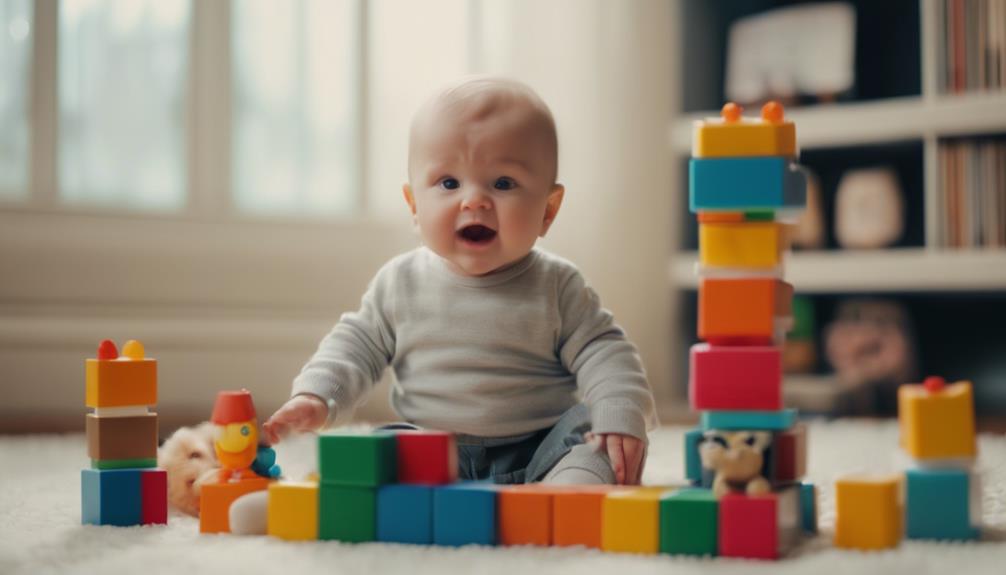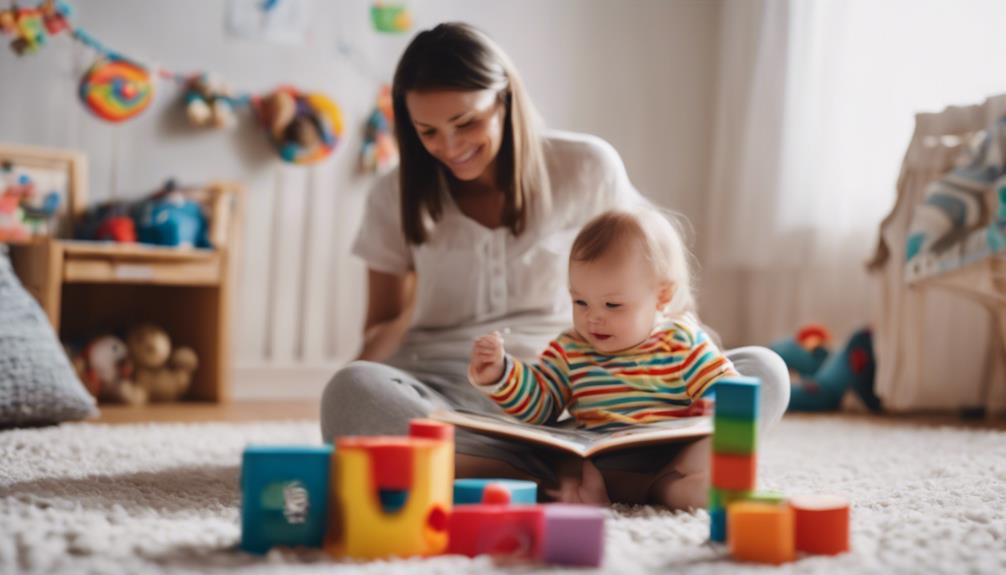If your baby is demonstrating an interest in playing musical instruments, consistently vocalizing, engaging with music, moving rhythmically, and persisting in achieving goals, these may be indications of advanced development. It is crucial to observe and nurture these behaviors as they could suggest cognitive and creative potential. Encouraging their musical interests and offering opportunities for rhythmic expression can aid in their growth. Take note of their interactions with sound, movement, and the challenges they take on. These signs might be early clues to their advanced abilities. Delve deeper to learn how to foster and promote your baby’s development.
Key Takeaways
- Early interest in complex activities like playing musical instruments or engaging with musical toys.
- Consistent vocalization and sound-making showcasing advanced cognitive development and language skills.
- Engaged behavior with music indicating heightened sensitivity to auditory stimuli and fostering cognitive growth.
- Physical movements showing rhythm suggest a natural inclination towards music and potential musical talents.
- Persistence in achieving goals, demonstrating determination and advanced development in babies.
Early Interest in Complex Activities
If your baby shows early interest in complex activities, such as playing musical instruments, it may indicate advanced cognitive development. Observing your little one engage with musical toys or instruments could be a sign of potential musical talent. This early fascination showcases a heightened sensory awareness and an affinity for intricate stimuli. Additionally, infants who display enthusiasm for physical movements in response to music may have an early appreciation for both rhythm and movement.
Not only does an interest in musical activities suggest advanced cognitive development, but it can also hint at problem-solving skills. Babies who persistently try to achieve goals, even in simple tasks like creating sounds with instruments, demonstrate determination and an ability to solve challenges.
Keep an eye out for these early signs of advanced cognitive development in your baby as they engage with complex activities, as it may pave the way for further exploration of their talents and abilities.
Consistent Vocalization and Sound-making

Babies who consistently vocalize and make sounds may be exhibiting advanced cognitive development, particularly in early language skills. These early signs of highly intelligent children often show a keen interest in communication and engagement with their environment. The curiosity and enthusiasm displayed through consistent vocalization indicate a desire to learn and interact with the world around them. This behavior can also be linked to advanced problem-solving skills as they explore different ways to express themselves.
Moreover, babies who engage in sound-making activities tend to have excellent memory retention, which can aid in language acquisition later on. By actively participating in vocalization, these advanced babies are laying the groundwork for early language development. Their ability to consistently make sounds showcases their advanced cognitive abilities and sets the stage for further linguistic growth.
Engaged Behavior With Music
Showing engaged behavior with music can indicate advanced cognitive abilities in infants. When babies exhibit persistent engagement with music, whether through vocalizations, movements, or showing interest in musical sounds, it suggests a heightened sensitivity to auditory stimuli. Research shows that auditory stimuli in infants can stimulate brain development, fostering cognitive growth and enhancing their overall learning experience.
By encouraging musical activities and exposing infants to diverse sounds, caregivers can nurture a child's interest in music from a young age.
Engaging with music from early on can have long-lasting benefits, potentially contributing to advanced cognitive abilities in infants. Musical engagement not only enhances brain development but also improves language skills and emotional regulation. Hence, incorporating music into a baby's routine can play an important role in their overall development.
Physical Movements Showing Rhythm

Noticing rhythmic movements in your infant may suggest a natural inclination towards music and a heightened sensitivity to auditory stimuli. Infants who exhibit physical movements in rhythm, such as swaying or bouncing, could have an advanced sense of musicality. These rhythmic actions may indicate an ability to feel and respond to beats, potentially leading to a strong connection to rhythmic patterns. Babies displaying consistent rhythmic behaviors might enjoy music-related activities and have a potential interest and aptitude in this area.
Early exposure to music and observing your infant's response to rhythmic movements can provide insights into their potential musical talents. If your baby shows a preference for rhythmic patterns or engages in physical movements that align with musical beats, it could be an early sign of their interest in music-related activities.
Encouraging and nurturing these behaviors can help foster their musical development and appreciation for rhythmic elements.
Persistence in Achieving Goals
To recognize signs of advanced development in your baby, observe their persistence in achieving goals as a key indicator of their potential. Advanced babies demonstrate a remarkable level of determination and focus in their actions and interactions. They show a strong commitment to overcoming challenges and accomplishing tasks, setting them apart from their peers. This unwavering dedication to achieving goals is a clear sign of advanced development in infants.
| Persistence in Achieving Goals | ||
|---|---|---|
| Determination | Focus | Unwavering Commitment |
| Overcoming Challenges | Accomplishing Tasks |
Frequently Asked Questions
How to Tell if a Baby Is Advanced?
You can tell if a baby is advanced by watching for early language skills, intense curiosity, and quick problem-solving abilities. They may have exceptional memory, heightened sensitivity, and a strong sense of justice.
How Do I Know if My Baby Is Progressing?
To know if your baby is progressing, observe their milestones, celebrate small victories, and trust their unique journey. Remember, a watched pot never boils – growth takes time. Enjoy the ride!
How Do You Identify How Advanced a Child Is in Their Development?
To identify how advanced your child is in their development, observe their milestones, language skills, problem-solving abilities, and curiosity. Notice exceptional alertness, motor skills, and cognitive abilities. Seek professional guidance if needed and provide a stimulating environment for growth.
How Can You Tell if a Baby Is Thriving?
You can tell if your baby is thriving by observing their overall happiness, growth, and development. Look for milestones like strong social connections, physical coordination, and cognitive skills. Trust your instincts and seek support when needed.
Conclusion
To sum up, if your baby is displaying early interest in complex activities, consistent vocalization, engaged behavior with music, physical movements showing rhythm, and persistence in achieving goals, they may be showing signs of advanced development.
Keep encouraging and supporting their curiosity and growth, as every milestone they reach is a proof of their unique abilities and potential.
Remember, every child develops at their own pace, so celebrate their individual journey with patience and pride.










